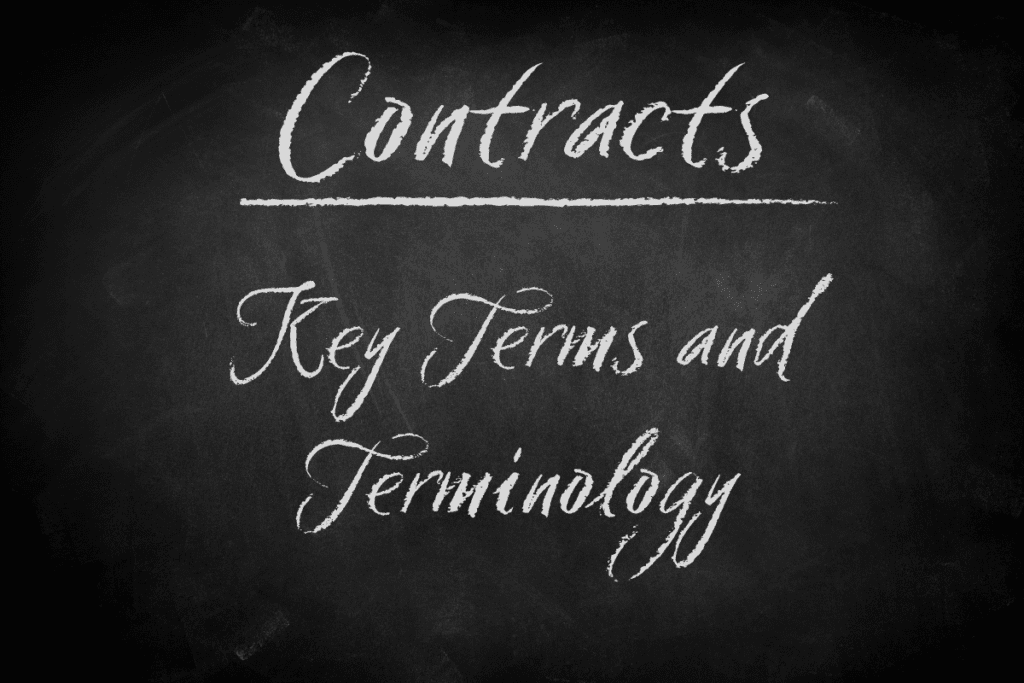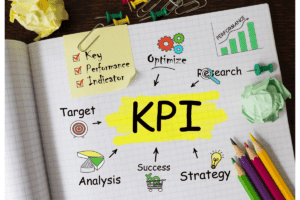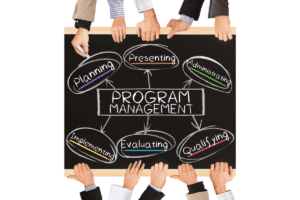Unlocking the Ultimate Glossary: A Comprehensive Guide to Key Contract Terms and Terminology in Vendor Contract Management
Navigating the complex world of vendor contract management can often feel like trying to decode a foreign language. With over 4000 key contract terms and terminology in existence, understanding each one is essential for protecting your business and ensuring successful partnerships.
This guide will unravel this intricate glossary, offering clear definitions, key examples and insightful comparisons. Intrigued? Let’s dive into the sea of contracts together!
Key Takeaways
- Understanding contract terms and terminology is essential for successful vendor contract management, as it ensures legal compliance, mitigates risks, and enables effective negotiation and dispute resolution.
- Knowing the different types of contracts (express, implied in fact, and implied in law) helps establish clarity and enforceability in agreements.
- Familiarity with the legal elements of a contract (classification, offer, acceptance, awareness, consideration, capacity, legality) is crucial for creating valid and binding contracts.
- Being knowledgeable about regulatory and compliance terms allows businesses to mitigate risks, ensure legal compliance, and maintain strong relationships with vendors.
The Importance of Understanding Contract Terms and Terminology

Understanding contract terms and terminology is crucial in vendor contract management, as it ensures legal compliance, mitigates risks, and enables effective negotiation and dispute resolution.
The following terms in contract management are crucial for navigating vendor contracts and effective negotiation.
A fundamental understanding of these terms is essential for ensuring legal compliance and mitigating risks in vendor contract management.
20 Key Contract Terms and Terminology
| Term Name | Description |
|---|---|
| Agreement | A mutual understanding between parties about their relative rights and responsibilities. It's the basis of a contract. |
| Breach of Contract | A violation of any of the agreed-upon terms and conditions of a contract. |
| Clause | A specific section or provision in a contract that pertains to a particular aspect of the agreement. |
| Consideration | Something of value exchanged between parties in a contract, often money for goods or services. |
| Due Diligence | The process of examining all the facts, especially before making a decision like entering into a contract. |
| Force Majeure | A clause that frees both parties from liability in the event of an extraordinary occurrence or act of God that prevents one or both parties from fulfilling their obligations. |
| Indemnity | A provision that protects one party from financial loss due to the actions or failures of another party. |
| Liability | Legal responsibility for one's actions or omissions. |
| Quid Pro Quo | An exchange where each party provides something of value to the other, fundamental in validating contracts. It denotes the mutual consideration or benefit involved in agreements, essential for their legal enforceability. |
| Material Breach | A significant breach of contract that permits the aggrieved party to terminate the contract. |
| Non-compete Clause | A clause that prevents one party from competing directly with the other party for a specified period and within a particular area. |
| Obligation | A duty or responsibility imposed by the terms of the contract. |
| Confidentiality Agreement | A clause that requires parties to keep certain information confidential. |
| Party | An individual or entity that enters into a contract. |
| Renewal | The act of extending the duration of a contract. |
| Master Service Agreement | An overarching contract that sets the general terms and conditions for multiple future agreements or transactions between parties. |
| Termination Clause | A provision that outlines the conditions under which a contract can be ended before the obligations are fulfilled. |
| Statement of Work | A document detailing specific project objectives, deliverables, scope, timelines, and responsibilities, often used in conjunction with an MSA for specific projects or tasks. |
| Warranty | A guarantee that a product or service will meet certain standards or specifications. |
| Governing Law | A clause specifying which jurisdiction’s laws will be used to interpret the contract. |
In Vendor Contract Management
Vendor contract management is the care of vendor contracts. It starts when we ask for a deal and ends when we get what we asked for. Clear rules in these deals tell everyone what they need to do and what they will get back.
Using commonly understandable words can help everyone know what they need to do. Leveraging software helps us take care of deals in a more efficient way. This mitigates problems and helps us win at vendor contract management.
In Ensuring Legal Compliance
Knowing common contract terms and terminology is key to following the law. These terms help you know what is contractually binding in vendor agreements. Contracts must be legal and fair. They should offer something for both sides.
All parties must agree on the same things.
If there’s a breach of contract, knowing these terms can protect your rights. It will show who broke the rules or didn’t meet their contract obligations. You can avoid financial penalties or going to court or arbitration by following these rules closely from start to finish.
In Mitigating Risks
Knowing contract terms helps cut risks. It stops unwelcome things from happening with the vendor contracts. To lessen risk, you need to catch it before the deal is done. This happens in talks that take place before signing.
Understanding these words can stop bad access to contracts too. Contract risk management measures how risky a contract might be. There are key parts in every contract to handle risks linked to mobile, social cloud and big data effects.
Key Contract Terms and Definitions

In this section, we will explore the various types of contracts and their legal elements, as well as regulatory and compliance terms that are important to understand in vendor contract management.
Contract Law Fundamental Concepts
There are three main fundamental concepts in contract law: Express, Implied in Fact, and Implied in Law. Express contracts are clearly stated and agreed upon by all parties involved. Implied-in-fact contracts are formed through the actions or conduct of the parties, even though they may not be explicitly written or spoken.
Implied-in-law contracts, also known as quasi-contracts, are created by a court to prevent unjust enrichment. Understanding these different types of contracts is crucial for effective contract management and ensuring legal compliance.
Three Common Types of Contracts
In vendor contract management, understanding the nuances of different types of contracts is paramount.
Each of these contract types comes with its own set of advantages and challenges. The choice depends on various factors like project scope, budget constraints, and risk tolerance. The level of clarity in project requirements also plays a role in this choice.
Understanding these contract types empowers businesses to make informed decisions, aligning their contractual agreements with their strategic goals and operational capabilities.
Fixed-Price Contracts
These contracts are defined by a set price for the goods or services provided. They offer a sense of financial certainty and are often preferred when the scope and scale of a project are clear from the outset. Fixed-price contracts are beneficial for budgeting and planning, as they lock in costs and protect against price fluctuations. However, they also require a thorough upfront understanding of project requirements to avoid future disputes.
Time and Materials Contracts (T&M)
In contrast to fixed-price agreements, T&M contracts bill based on the actual time spent and materials used on a project. This type of contract is advantageous when project scopes are not clearly defined or are expected to evolve. It offers flexibility but requires careful monitoring to keep budgets in check. T&M contracts are often used in scenarios where agile responses and adaptations are necessary.
Cost-Plus Contracts
These agreements involve payment of the actual costs, purchases, or other expenses generated directly from the construction activity. Cost-plus contracts are beneficial when project specifics are uncertain or likely to change. They provide flexibility in adjusting the scope of work, but they also require transparent documentation and regular auditing to ensure that costs are legitimate and necessary.
Legal Elements of a Contract
A contract has certain legal elements that must be present for it to be considered valid and enforceable. These elements include classification, offer, acceptance, awareness, consideration, capacity, and legality.
Classification refers to the type of contract being formed, such as a written or verbal agreement. Offer is when one party proposes specific terms and conditions to another party. Acceptance occurs when the other party agrees to those terms without any changes.
Both parties involved in the contract must have full awareness of what they are agreeing to. Consideration refers to something of value that each party gives or promises in exchange for what they will receive under the contract.
Capacity means that both parties have the legal ability and competence to enter into a contractual agreement. Lastly, legality ensures that the purpose of the contract does not violate any laws or public policy.
Understanding these legal elements is important because they establish the foundation for a legally binding agreement between parties. Without these elements being met, a contract may not hold up in court if disputes arise later on.
Regulatory and Compliance Terms
Understanding regulatory and compliance terms is crucial for effective vendor contract management. This involves knowing the rules and regulations that apply to contracts, both legally and in a business sense.
Contract compliance refers to adhering to the agreed-upon standards in the contract, ensuring that all parties fulfill their obligations and meet legal requirements. It is important to navigate this process carefully to avoid any breaches or disputes.
By being knowledgeable about regulatory and compliance terms, businesses can mitigate risks, ensure legal compliance, and maintain strong relationships with vendors. Streamlining negotiations, maintaining consistency of terms across contracts, and properly managing documents are key best practices for achieving contract compliance.
Agile Contracts in Vendor Contract Management

Agile contracts are becoming increasingly important in vendor contract management, particularly in projects that employ Agile methodologies like Scrum. These contracts are designed to accommodate the flexible, iterative, and collaborative nature of Agile project management.
Agile Contracts Overview
Unlike traditional contracts that focus on delivering a fixed scope of work, Agile contracts are structured to embrace change and uncertainty. They are built around the principles of collaboration, flexibility, and iterative progress. This approach aligns well with Agile methodologies, where requirements and solutions evolve through the collaborative effort of self-organizing cross-functional teams.
Key Features of Agile Contracts
-
- Flexibility in Scope: Agile contracts typically allow for changes in project scope, accommodating the evolving nature of requirements in an Agile project.
- Iterative Delivery: These contracts emphasize delivering work in small, manageable increments, allowing for regular review and adaptation.
- Collaborative Approach: Agile contracts often include provisions for close collaboration between the client and the service provider, ensuring that both parties work together towards a common goal.
- Focus on Value Delivery: Instead of merely delivering a set of predefined deliverables, Agile contracts focus on the continuous delivery of value to the client.
Advantages in Agile Project Environments:
-
-
- Adaptability to Change: Agile contracts are well-suited for projects where requirements are expected to change or are not fully defined at the outset.
- Enhanced Risk Management: By allowing for regular reassessment and adaptation, these contracts help in better managing risks associated with changing project landscapes.
- Stronger Vendor-Client Relationships: The collaborative nature of Agile contracts fosters a more transparent and trust-based relationship between vendors and clients.
-
Considerations for Implementing Agile Contracts:
-
- Defining Metrics for Success: It’s crucial to establish clear metrics for evaluating the success of deliverables in an Agile contract.
- Managing Expectations: Both parties should have a clear understanding of the flexible nature of the project scope and the iterative process.
- Legal and Financial Implications: Agile contracts require careful drafting to ensure that legal and financial aspects are adequately addressed, considering the flexible scope and iterative nature of Agile projects.
The Gatekeeper Glossary: A Comprehensive List of Essential Contract Terms

Discover the crucial contract terms you need to know in our comprehensive glossary. From legally binding clauses to key performance indicators, this guide unlocks the ultimate knowledge for effective vendor contract management.
Definition and Explanation of Terms
The definition and explanation of contract terms and terminology are essential in understanding contract management. It is important to know the different types of contracts, such as agreements for goods or services.
Understanding legal elements like clause language and regulatory compliance terms is crucial too. A comprehensive glossary can provide examples and explanations for key contract terms that everyone should be familiar with.
This includes phrases related to contractual obligations, termination, negotiation, breach of contract, and more. Knowing these terms can help individuals navigate through the complexities of vendor contract management effectively.
Examples of Usage
The Gatekeeper Glossary provides examples of how key contract terms are used in vendor contract management. For instance, one important term is “termination,” which refers to the ending of a contract before its completion.
An example of usage could be a situation where a company terminates a contract with a vendor due to poor performance or breach of the agreement. Another term is “negotiation,” which involves discussions and agreements between parties before finalizing the terms of a contract.
An example would be when two companies negotiate the pricing and delivery schedule for a product or service they plan to work on together. These examples show how understanding and applying these terms can help businesses navigate their contracts effectively.
Additionally, it’s crucial to know about “legal rights” defined in contracts. This term represents the entitlements granted to individuals or companies through written agreements. For instance, if there is an intellectual property clause in a contract, it defines who owns any new inventions or creations resulting from their collaboration.
Understanding this concept helps protect both parties’ rights and ensures fair treatment throughout the contractual relationship.
Best Practices for Effective Vendor Contract Management
Effective vendor contract management involves ensuring clear payment terms and conditions, placing importance on insurance requirements, and evaluating vendor performance regularly.
Payment Terms and Conditions
Payment terms and conditions refer to the details of how and when payments are made in a vendor contract. These terms include things like the cost of services or products, when payments are due, who receives the payment, and any penalties for late payments.
In procurement, payment terms outline the specific conditions and timing for settling financial obligations with suppliers. The specific payment terms can vary depending on the agreement between parties, taking into account factors such as the nature of the product or service, payment history with the vendor, and market conditions.
It is important to understand these terms to ensure timely payments and maintain good relationships with vendors.
Importance of Insurance Requirements
Insurance requirements play a crucial role in contract management. They are necessary to protect both parties involved and cover any claims or losses for which the contractor/vendor may be responsible.
By implementing insurance requirements, organizations can mitigate risk and ensure regulatory compliance. It also enhances operational resilience by providing financial protection in case of unforeseen events or accidents.
The specific insurance policies that vendors should have vary depending on the organization and the nature of the contract. These policies may include general liability insurance, professional liability insurance, and workers’ compensation insurance, among others.
Evaluating Vendor Performance
To ensure effective vendor contract management, it’s important to evaluate the performance of vendors. This helps assess their ability to meet contractual obligations and deliver goods or services as agreed upon.
Key performance indicators (KPIs) are used for this evaluation process. These metrics provide insights into areas such as on-time delivery, quality, responsiveness, and overall satisfaction with the vendor’s performance.
By regularly assessing vendor performance using objective criteria, businesses can make informed decisions about whether to continue or modify their relationships with vendors.
Leveraging Procurement Analytics for Successful Contract Management

Procurement analytics plays a crucial role in successful contract management by extracting data from procurement processes, identifying areas for improvement, and maximizing contract value while minimizing risks.
Furthermore, using Contract Lifecycle Management (CLM) software can help manage contracts effectively from pre-signature to post-signature.
Extracting Data from Procurement Processes
Procurement analytics involves getting information from procurement processes. These data can help negotiate better deals and understand pricing trends, historical information, and market benchmarks.
Contract management software can help search for specific terms in contracts with suppliers. AI-based systems can automatically extract important details from contracts. Procurement analysis reports and tools are used to analyze procurement data better.
Identifying Areas for Improvement
To identify areas for improvement in contract management, it is important to analyze data and gather insights from procurement processes. By leveraging procurement analytics, organizations can uncover trends and patterns that reveal inefficiencies or risks in their contract management practices.
This analysis can help identify areas where contracts are not being effectively managed, such as delays in contract renewals, high rates of contract disputes, or missed opportunities for cost savings.
By identifying these areas for improvement, businesses can take proactive steps to enhance their contract management strategies and ensure better outcomes in vendor relationships and overall business performance.
Maximizing Contract Value and Minimizing Risks
To maximize contract value and minimize risks, organizations need to implement effective contract management strategies. This includes carefully reviewing and negotiating key terms such as payment conditions, insurance requirements, and performance evaluations.
Leveraging procurement analytics can also help identify areas for improvement and extract valuable data from procurement processes. By ensuring compliance with regulatory standards and monitoring vendor performance, businesses can mitigate financial, operational, and reputational risks associated with contracts.
This proactive approach helps organizations make the most out of their contracts while minimizing potential negative outcomes.
FAQs
1. What does vendor contract management mean?
Vendor contract management is where the business leaders manage your contracts with third parties who sell goods or services.
2. What can you find in a contract management glossary?
In a contract management glossary, we can find common terms like ‘contract obligations,’ ‘intellectual property rights,’ and other phrases you need to know about when dealing with legal matters.
3. Can I automate my contracts?
Yes, using tools for digital contract administration allows automation in every step from creation to signing by all parties.
4. Would a breach of the legally binding contract occur if it’s not signed by all parties?
A signed document makes a legal obligation official. So yes, if someone within the deal doesn’t sign, it could lead to a breach of the contract.
5. How should I handle intellectual property rights in my vendor contracts?
Intellectual property rights should be clearly written in a contract clause detailing ownership status and rights involved during any stage of the partnership.
6. Can an individual or company use smart management tools for their contracts?
Absolutely! Contract managers use smart tools that make managing everything from negotiations to understanding complex contractual terms easier.
Conclusion
In conclusion, understanding contract terms and terminology is crucial for effective vendor contract management. By unlocking the ultimate glossary of key terms, businesses can ensure legal compliance, mitigate risks, and maximize contract value.
With the right knowledge and tools in place, organizations can confidently navigate the complexities of contracts and optimize their vendor relationships.
If you liked this article, remember to subscribe to MiamiCloud.com. Connect. Learn. Innovate.






